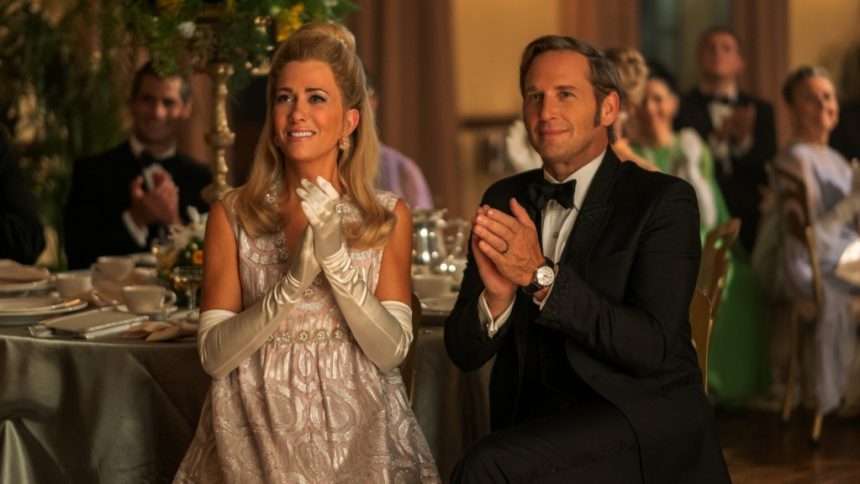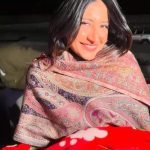[This story is focused on the sixth episode of Palm Royale, “Maxine Takes a Step.”]
In Palm Royale, parties and Palm Beach high society go together like Maxine Dellacorte (Kristen Wiig) and her signature grasshopper cocktail. But pulling off these ostentatious displays of wealth and popularity disguised as charitable events, episode after episode, was no small feat for the production team behind the Apple TV+ series.
“We shot episode one and two together with Tate Taylor directing, and it was back-to-back balls. Then we got to episode four and there was another one, and then we got to episode six and there was another one, and we’re like, ‘Oh my God, we’re doing Palm Beach Bridgerton,’” production designer Jon Carlos tells The Hollywood Reporter. “We realized we really have to up the ante on every single one of these parties. They have to be insane and then the next one has to be even more insane.”
The elite gatherings of the Palm Beach social season commenced with Dinah (Leslie Bibb) receiving the Volunteer of the Year Award, followed by Mary’s (Julia Duffy) auction for fibrosis and the grandest of the festivities thus far: Raquel’s (Claudia Ferri) Havana Nights party. All of which will lead to the highly anticipated Beach Ball where a noted staple of Hollywood décor will be on display, teases set decorator Ellen Reed.
“Big Bertha is a chandelier that’s infamous in town that hardly ever goes out, because there’s usually never a set large enough to accommodate her. And we had that,” shares Reed. “She’s only been in a handful of things in all of time in Hollywood, so that speaks to the enormity of the set itself.”
The galas aren’t the only locations where grandeur is on display in Palm Royale. The homes of each socialite were chosen not only to reflect their personality but their status within their exclusive community, Norma Dellacorte (Carol Burnett) being the most distinguished among them.
“Norma’s such a layered character and such a fixture in Palm Beach, and when we researched the interior decorators of the day, we found Tony Duquette and decided he was an interior decorator that Norma would’ve hired,” explains Reed. “Tony Duquette got his start in theater and film, and then went into interiors. He traveled the world and brought back fabulous items from all over the globe, and with Norma being a well-traveled woman, she would’ve hired him to shop in Europe and Asia and bring these items back to her home.”
Below, Carlos talks with THR about recreating the look and feel of Palm Beach in Los Angeles for the series, from building a fountain in the middle of the Biltmore Hotel to the gossipy history he learned from the Palm Beach Preservation Foundation that shaped two characters’ storylines.
***
What did your pre-production research process entail?
Really early on we knew that we were going to be filming a lot of the show here in Los Angeles, and we had to bring the essence of Palm Beach here. The question was, do you think it can work? Looking at the history of architecture in both cities, a lot of it being built around the teens, ’20s, ’30s, we have so much similarity in terms of romantic European mansionettes and villas, so we felt pretty confident that we could do it. But Tate [Taylor] and I were like, “we have to get out there and feel the flavors.” So they packed us up on a plane, we shot out there and spent a couple of days driving around and looking at iconic establishments that we knew were Palm Beach staples — Worth Avenue, Mar-a-Lago, Bath & Racquet Club, Everglades — and trying to find elements that might be slightly lesser known, but beautiful compositions or architectural masterpieces. For example, Destiny Vistas, the exterior, is an actual location in Palm Beach.
We met with the Palm Beach Preservation Foundation and asked them to give us the layered history of Palm Beach from the beginning, the late 1800s, early 1900s, all the way to the big mansions being built in the ’20s and ’30s, and then specifically what was happening in the time period of the ’60s. What real estate development was going on? What was the cultural change that was going on? How much was it aware of Vietnam, or was it its own little bubble? They gave us a lot of amazing information on the textbook history, but they also gave us a lot of color on the gossip history.
For example, all those big estates being torn down on the ocean side was so they could build these big mid-century modern condominium towers. So when an estate would go down, there’d be these flash estate sales where people would run in and grab sconces off the walls and candelabras, and they said you would never be caught dead with a piece from that house that was torn down because it would be known that you thrifted. So we could play with that and be like, “Oh, that’s Raquel’s character. Her and Pinky would definitely have thrifted.” Probably one of the most memorable moments was Tate in flip flops and shorts just walking right up to the valet of the Everglades Club and they’re like, “Membership ID sir.” They were very polite, but it was basically kind of like, “shoo,” so we got to admire it from across the street. We debated scaling the bouvardia-clad walls just like Maxine, but that probably wouldn’t have boded well.
How did all of that information shape the design of the Palm Royale Beach Club?
The club itself is fictitious. It’s kind of loosely based off the Everglades, the Bath & Racquet Club. But it needed to be its own animal. So we used the architecture of the Everglades Club which was designed by architect Addison Mizner and is this unbelievable Palm Beach staple. We were also really inspired by the Court of Oranges, which is a central courtyard where they would have a lot of their galas and there was this alfresco inside outside space. The fall in the season in Palm Beach is beautiful weather, so enjoying the inside to outside was something that really drove our search.
But it’s a very layered ask in terms of location. They want a golf course, a tennis court, a pool, these ballrooms. We knew that we weren’t going to find all of those in one space perfectly in Los Angeles, so it was an amalgam of multiple. The pool was one location and then everything around the pool was brought in: the plants, the hedges and that white regency facade behind Maxine was a build. We do have aerial photography in the show that features the ocean side of the Bath & Racquet Club, kind of insinuating that’s it. The facade was shot at the Bel Air Bay Club in the Palisades. It had a clock tower very similar to the Everglades Club and it has a fairly period-accurate facade. We did bring in our own awning and kind of dolled it up with some plants, but the majority of the interior spaces, like the ballrooms and the courtyard, were filmed at the Wilshire Ebell in Hancock Park.
How did you find Norma’s house?
We probably scouted over two dozen houses looking for Norma’s, and the second I walked onto the property of this one, I was like, “This is it.” It had this sort of Wuthering Heights vibe with the romantic Ivy growing over the house. We had assigned a certain style of architecture that we wanted for each of the women. For example, Dinah was assigned a colonial house that felt more prim and proper, a little bit more from the upper East Coast. Her husband’s a diplomat, so it’s very stepped in Americana. And for Evelyn, we wanted something more Spanish colonial. So with Norma, we wanted to lean a little bit more Italianate like a villa, and this one had that vibe.
The pink hue was an immediate sell with the vines growing over it and the statue that’s sort of forgotten. She’s been spending some time in assisted living, so the house is still being maintained but there’s this beautiful neglect that’s happening. The estate had amazing grounds and an unbelievable landscape, and it a really beautiful entryway. Each of the rooms beyond that were a bit on the smaller side, so at the location, we only used the foyer, the dining room and then the very first fitting room off the foyer, in addition to the backyard and the front. Everything else was a stage build: Norma’s smoking room, Norma’s Parlor and Norma’s bedroom. Those were areas we wanted to really control in terms of scale, style, color, palette and décor, so we took the house as a nucleus and grew off of it and matched it on stage.
Allison Janney in ‘Palm Royale’
Apple TV+
Abe Sylvia said you built a fountain in the middle of the Biltmore hotel for the Havana Nights party in episode four. How did you pull that off?
That scene was scripted to shoot at Raquel’s house originally. And when we were looking at houses, Abe fell in love with one that had this incredible pool. We started developing the idea and then we realized it needs to be at night, and that shooting four nights in a row was going to be really taxing on the crew and the actors and the neighborhood that we needed to shoot in. I said we could do it at the Biltmore, which Ellen and I are very familiar with.
We’ve filmed there. It’s a staple. So we knew the comfort of the Biltmore, but we also knew that the Biltmore is seen quite often. So we had to do something that really shifted the look. Abe was heartbroken. He said, “but I don’t get my pool.” And I said, “Why not? We’ll build a pool.” We have a really good relationship with Ang at the Biltmore, and she trusts us, so we decided we were going to build the pool. We had to have engineers come out to make sure that it could support the weight of the water. It was about 20 feet by 40 feet, and all the tile on the bottom of it was a print on metal. It was the only thing that would sink to the bottom. So that was the baseline and it grew from there.
We started talking about, how do we get verticality and explosions of color in that space? We had just done episode two, the Fidbid auction, where we brought these big palm trees into the ballroom of the Palm Royale, so it was like: we can’t do palm trees now. So we said, what if we create palm trees out of neoclassical columns, urns and then shot eight-foot ostrich feathers out of it? And when Alix Friedberg showed us her color palette for Raquel’s dress, we wanted to incorporate that same plum. So then it morphed into creating custom-dyed ostrich feathers that would ombre from the plum to a dark teal to a light teal to kind of get that explosion and relate the whole color palette back down to Raquel again. And then Ellen just took it from there and went crazy with the florals in that space.
How did you approach the finale Beach Ball after creating a set of that scale?
When we moved into the Beach Ball, it felt like we’d been warming up all season for that. That was a huge set built on Paramount that expanded over the course of a stage-and-a-half. The division between the two stages is actually the proscenium arch of the stage that Maxine performs on. When we first realized the footprint we needed, we got an outline and we knew kind of the scripted action, and the fact that the entire episode is basically in this tent. So you have to have enough areas and pockets that have different but related looks and feel visually stimulated. We had five weeks, so I did the first sketch on paper, showed everyone, and everyone’s like, “Hey, that kind of works,” then we immediately went into drafting and simultaneously had Ellen outsourcing all of her fabrics. It was this amazing combination of all the crafts. Luckily most of us did Westworld together literally just before this, and we’ve done it season after season, so we had this perfect synchronicity.
The thing about this show is there’s such exuberance and exaggeration, but it’s kind of rooted in the reality of who these women actually are. There’s so many elements that you see in prop warehouses and rental houses that are over the top and you’re like, “when are we ever going to be able to use an eight-foot clamshell?” And then Abe writes a scene where Maxine’s recreating the birth of Venus from Botticelli’s Venus, and you use that clamshell and it’s so exciting. This show just let us kind of flex that muscle that we wanted to and hadn’t been able to because it wasn’t appropriate in past projects.
Palm Royale releases new episodes Wednesdays at midnight PT on Apple TV+











